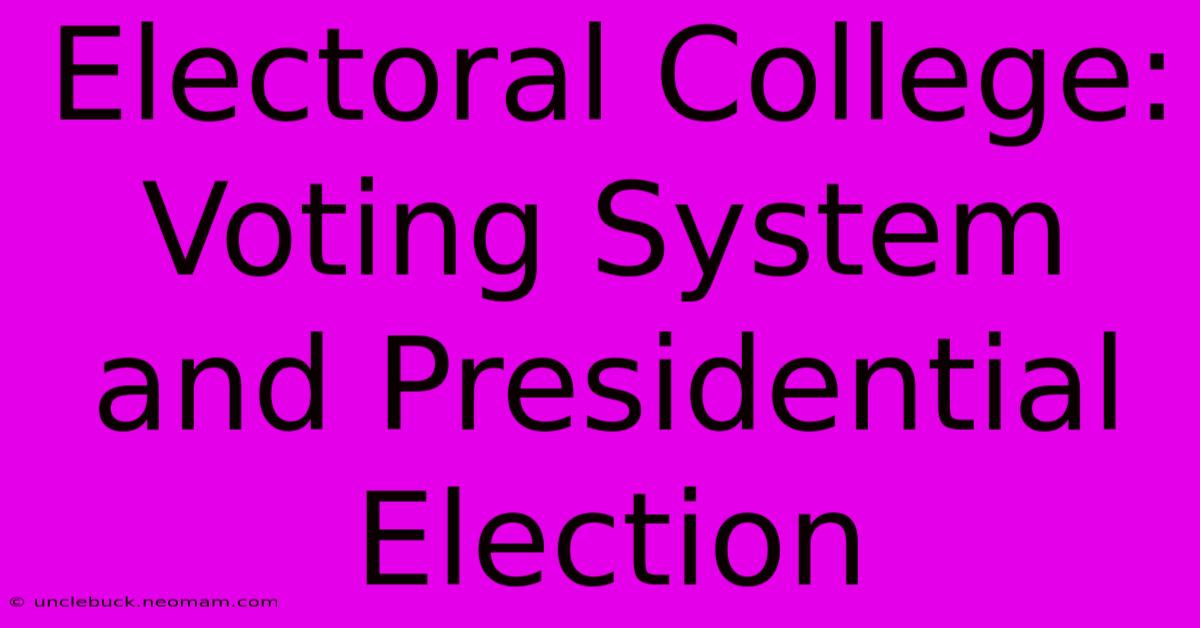Electoral College: Voting System And Presidential Election

Discover more detailed and exciting information on our website. Click the link below to start your adventure: Visit Best Website. Don't miss out!
Table of Contents
Electoral College: Voting System and Presidential Election
The United States Presidential election is a complex process, and one of its most controversial aspects is the Electoral College. This unique system has been a part of American democracy since its founding, but its relevance and fairness have been intensely debated throughout history. In this article, we'll delve into the details of the Electoral College, exploring its workings, historical context, and the arguments for and against its continued use.
Understanding the Electoral College
The Electoral College is a body of electors established by the U.S. Constitution, constituted every four years for the sole purpose of electing the president and vice president of the United States. It's a system of indirect election, meaning that voters don't directly choose the president; they choose electors who then vote for the president.
Here's how it works:
- Each state is allocated a number of electors based on its total number of senators and representatives in Congress. This means states with larger populations have more electoral votes. For example, California, with its large population, has 55 electoral votes, while Wyoming, with a smaller population, has only 3.
- In most states, the candidate who wins the popular vote in that state wins all of its electoral votes. This is known as the "winner-take-all" system.
- A candidate needs to secure at least 270 electoral votes out of a total of 538 to win the presidency. This threshold is determined by adding the number of electors from all states and the District of Columbia.
Historical Context
The Founding Fathers established the Electoral College to address several concerns. They feared direct popular elections would be susceptible to mob rule and that candidates would only focus on densely populated areas. The Electoral College, they believed, would ensure that candidates paid attention to the needs of smaller states and regions. Additionally, it was a compromise between those who wanted the president chosen by Congress and those who favored a direct popular vote.
Arguments for the Electoral College
- Protects smaller states: By guaranteeing each state a minimum number of electors, the Electoral College ensures that smaller states have a voice in the presidential election.
- Promotes national unity: It forces candidates to campaign across the entire country, rather than focusing solely on large, urban centers.
- Prevents tyranny of the majority: The Electoral College system protects against the possibility of a single candidate winning the presidency with a narrow majority of the popular vote.
Arguments against the Electoral College
- Unfair and undemocratic: The system allows a candidate to win the presidency without winning the popular vote, as happened in 2000 and 2016. This has led to accusations of being undemocratic and unfair.
- Discourages voter participation: In states where one candidate is heavily favored, voters may feel their vote doesn't matter, leading to lower voter turnout.
- Not representative of the will of the people: The Electoral College can result in a president being elected who did not receive the most votes nationwide.
The Debate Continues
The debate over the Electoral College continues to be fiercely contested. Proponents argue that it's a vital part of the American system, preserving the rights of smaller states and ensuring national unity. Opponents argue that it's an archaic system that undermines democracy and fails to accurately represent the will of the people.
As the U.S. continues to evolve, the future of the Electoral College remains uncertain. It's a complex issue with strong arguments on both sides. Understanding the Electoral College's history, its workings, and the arguments for and against its continued use is crucial to engaging in informed and meaningful discussions about the future of American democracy.

Thank you for visiting our website wich cover about Electoral College: Voting System And Presidential Election . We hope the information provided has been useful to you. Feel free to contact us if you have any questions or need further assistance. See you next time and dont miss to bookmark.
Also read the following articles
| Article Title | Date |
|---|---|
| Liverpool Demuetigt Leverkusen Mit 0 4 | Nov 06, 2024 |
| Kelce On Phone Spike Hate Begets Hate | Nov 06, 2024 |
| Millionenpleite Gewerbepark Projekt Gescheitert | Nov 06, 2024 |
| Monaco S Impose Face A Bologne En Ligue Des Champions | Nov 06, 2024 |
| Mikes Minute Trumps Bullsh T And Win | Nov 06, 2024 |
| Milan Vence Al Real Madrid En El Bernabeu | Nov 06, 2024 |
| Fifa Club World Cup Faces La Liga Scrutiny | Nov 06, 2024 |
| Viktor Triple Sporting Bat City | Nov 06, 2024 |
| Election Night Los Alamos Gop Watch Party | Nov 06, 2024 |
| Securite Mondiale Carte Des Risques 2023 | Nov 06, 2024 |
